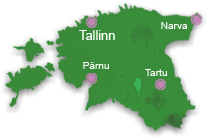| Companies | Tourist Attractions & Sightseeing | Map Search |
The Many Reasons Estonia Is a Tech Start-Up Nation14.June 2012
Estonia is the 132nd-smallest country in the world by land mass, yet it produces more start-ups per head of population than any other country in Europe. It has a population the size of Copenhagen but has one of the world's most advanced e-governments. What is it about this former Soviet state, with an obscure language and unenviable weather, that produces so many start-ups? Of the 20 finalists in January's Seedcamp, an entrepreneur-mentoring program, four were Estonian—including the eventual winner, GrabCAD, a social network for engineers which has 10% of the world's mechanical engineers registered.
According to Antti Vilpponen, CEO and cofounder of ArcticStartup, a site that follows entrepreneurship in the region, Estonia has three things in its favor: political leadership, the success of Skype, and its culture. The leadership has been clear and consistent. President Toomas Hendrik Ilves, the country's fourth president in modern times, wouldn't be offended to be described as a geek. On the desk in his personal office is a 27-inch iMac; he owns a MacBook Air and an iPad2 as well. He used to program in assembler. Mr. Ilves recently got into a very public spat with the economist Paul Krugman. It says something about his embracing of technology that the head of state chose Twitter as his battlefield. How many other world leaders write their own tweets? That leadership took the form of investment from independence in 1991 in computerization. The country is lauded for its flat tax, which helped build support for e-government, said Mr. Ilves. "If you combine a flat tax with a computerized system you end up with a system that is easy to computerize because it is flat, and because it is flat and computerized then people can—and indeed do—do their taxes really quickly." The country has since adopted e-voting, an e-health system and introduced the ability to sign documents using an electronic signature. Then there is the vital role played by success. Talking to Estonian entrepreneurs, one company crops up time and time again: Skype. While the company was founded by a Swede and a Dane, it was built by Estonians. "You need a local success story to legitimize creating startups as a viable business," said Taavet Hinrikus, founder of TransferWise, a currency-exchange service. A view shared by Andrus Purde, cofounder of Achoo, a social-networking website for professionals. "Many people realized that if the guy you used to play basketball with can change the world from Estonia, then so can you." Then, crucially, there is the culture; in Estonia it was forged in the years of brutal occupation. "The crucial element is the psychology of having been oppressed," said Mr. Ilves. "You get rid of everything you had before. Few people in Estonia found any value in maintaining the traditions of the Soviet system." Mr. Hinrikus said the Soviet experience engendered a can-do attitude. "Back in the days there was no one there to help you, if you needed something you had to build it yourself. That has given us all a hands-on getting-things-done attitude that is also a necessity for start-ups." Paradoxically, Estonia's size has played a key role. It is simply too small to support local players. "The size of our domestic market—or rather the lack of it—forced us to create ideas that are global by nature," said Heikki Haldre, CEO of Fits.me, a service for online fashion stores.
And finally there is the weather—and let's be honest, it is pretty awful. But even that, says Tõnis Saag, CEO and co-founder of Sportlyzer.com, an online fitness site, was a help. "It takes a very patient person to build technology as well as to live in Estonia with five hours of daylight in winter and five hours of darkness in summer." But before running away with the idea that Estonia's start-up community is some runaway success story, it is worth mentioning that despite its success, Estonia remains among the European Union's poorest nations; gross domestic product per capita is just €13,194 ($16,500), half that of nearby Sweden (€27,039)—but substantially more than its two neighbors, Latvia (€9,930) and Lithuania (€11,041). Furthermore unemployment remains high, at 16.8% in 2010.
While many have praised Estonia's flat tax, at a recent start-up conference in the capital's technical university complaints were raised over the lack of arrangements for stock options, a favored tool for attracting talent. Was there any chance that this most favored of sectors would get special dispensation? Not a chance, said Mr. Ilves. "No exceptions to anything. It is the exceptions that end up killing you," he said. In the start-up world, one has to be careful to separate out fact from hype, cautions Andres Susi, CEO and cofounder of Tallinn-based dating site Flirtic.com. "I think Estonians have done a good job in marketing themselves as a 'startup nation.' It's still to be proven whether we can turn the start-ups into real companies." So as Estonia prepares to celebrate its coming of age this August, when it will mark 21 years since the end of the Soviet occupation, the country can look back at how far it has come, but face the future knowing that it has a lot still to prove.
|




)
